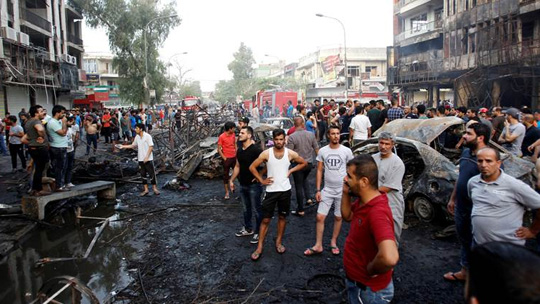New Delhi, Jul 3: The death toll in the Baghdad blasts in two crowded commercial areas has now hit 83 with 176 people injured, a government official confirmed.
Iraq Prime Minister Haider al-Abadi toured the site of the blast Sunday morning.
The bombings came near the end of the holy month of Ramadan, when the streets were filled with young people and families out after sundown.
Video footage uploaded to social media showed an angry crowd at the blast site in the Karada district of the capital, with people shouting at the convoy and calling Prime Minister Haider al-Abadi a ‘thief'.
Karada, a Shiite-majority neighborhood, was where the first attack struck. A car bomb exploded in this central district, killing 18 people and wounding 45. Shortly afterward, an improvised explosive device went off in eastern Baghdad, killing 5 people and wounding 16. The death toll has since risen.
The officials who provided the casualty figures spoke on condition of anonymity as they were not authorized to release the information.
The Islamic State group claimed responsibility for the attack in the Karada district in a statement posted on a militant website. The statement said a suicide car bomber targeted Shiites and warned that “the raids of the mujahedeen (holy warriors) against the Rafidha (Shiites) apostates will not stop.”
The statement could not be independently verified.
At dawn Sunday, fire fighters were still working to extinguish blazes at the Karada blast site and bodies were still being recovered from charred buildings. Many of the dead were children, according to a team from The Associated Press at the scene. Ambulances could be heard rushing to the site for hours following the blast. An eyewitness said the explosion caused fires at nearby clothing and cellphone shops.
The Baghdad attacks come just over a week after Iraqi forces declared the city of Fallujah “fully liberated” from IS. Over the past year, Iraqi forces have racked up territorial gains against IS, retaking the city of Ramadi and the towns of Hit and Rutba, all in Iraq's vast Anbar province west of Baghdad.
Despite the government's battlefield victories, IS has repeatedly shown it remains capable of launching attacks far from the front-lines.
Before the launch of the operation to retake Fallujah, Iraq's prime minister was facing growing social unrest and anti-government protests in Baghdad sparked in part by popular anger at the lack of security in the capital. In one month, Baghdad's highly-fortified Green Zone _ which houses government buildings and diplomatic missions _ was stormed twice by anti-government protesters.
IS still controls Iraq's second largest city of Mosul as well as significant patches of territory in the country's north and west.
At the height of the extremist group's power in 2014, IS rendered nearly a third of the country out of government control. Now, the militants are estimated to control only 14 percent of Iraqi territory, according to the office of Iraq's prime minister.






Comments
Add new comment